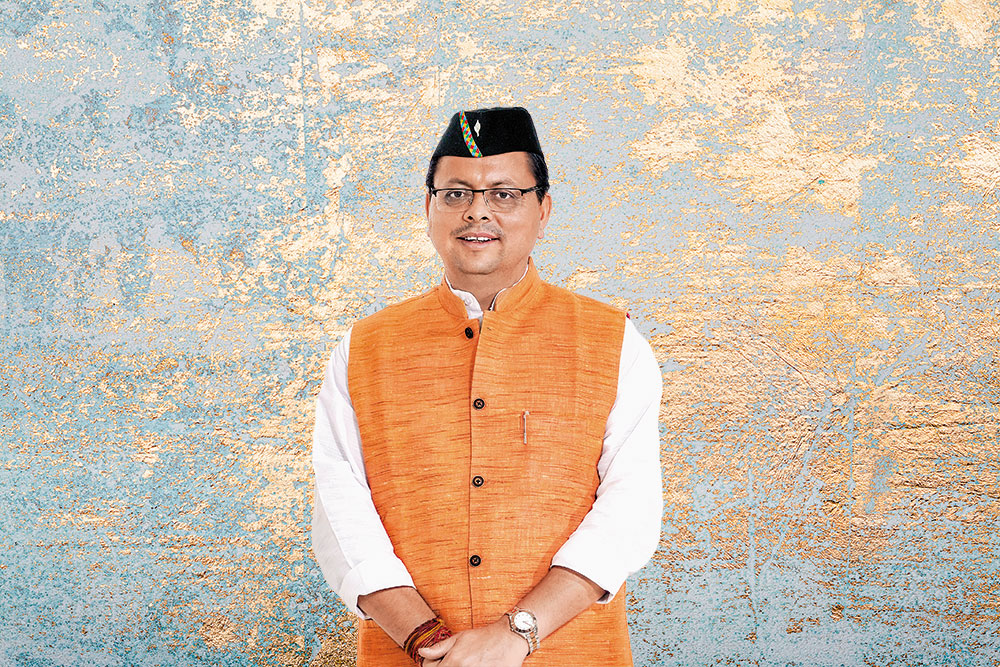The Bharatiya Janata Party (BJP) has had many leaders who became chief ministers without winning an assembly election. Prime Minister Narendra Modi was one such leader when he first became the chief minister of Gujarat in 2001. Yogi Adityanath also falls in the same category. However, it is not usual for a BJP leader to lose an assembly election and still become a state chief minister. Pushkar Singh Dhami has performed this feat and, with it, claimed a special place for himself in the party.
That the BJP is a faction-ridden unit in Uttarakhand is a known fact, something that shows in Dhami’s rise to the top post in the state. He was the party’s third chief minister there since 2017, when it defeated the Congress in the assembly. Not just that, he was made the chief minister in the last year of the assembly’s term. When the next round of assembly election took place in the state in February, the BJP won an unprecedented second consecutive term with 47 seats in a 70-member house under his leadership. However, he lost from the Khatima assembly constituency in the Udham Singh Nagar district and won his access to the unicameral house only after a by-election in the Champawat seat.
Birth of a Young Turk
Thus was born a new leader in the BJP. Being more than a decade younger than his two predecessors, the central leadership’s faith in him sits well with the BJP’s philosophy of preparing the relatively younger leaders well before the senior ones have opted for or are forced into retirement. At 47, he ticks many boxes for the party. He can be called a leader from the plains—Khatima was his earlier constituency—or the hills, since his family hails from Kumaon’s Pithoragarh district. He can justly claim to be a man of the grassroots, as he has risen up through the ranks of the Akhil Bharatiya Vidyarthi Parishad and the Bharatiya Janata Yuva Morcha. Moreover, he has two degrees to impress the educated voter.
Dhami is aware of the role the state demography can play in election results. He told Outlook Business: “Uttarakhand is a young state. Youth are in a majority here and have an astute political sense. I am grateful to the youth for supporting me.” However, he adds expectedly that the consecutive success of his party in the state can only be attributed to Modi’s leadership at the national level.
As the past trends indicate, the BJP starts grooming the next generation of chief ministers when its best candidates for the post are in the late 40s or early 50s. Modi was 51 when he became the Gujarat chief minister for the first time. Last year, the party chose former Congressman Himanta Biswa Sarma as the Assam chief minister when he was 52, who by all accounts is a long-distance runner for the party. Add Goa’s Pramod Sawant, 49, to the mix and the party has a whole generation of state leadership ready.
Dhami is the youngest of the lot and enjoys the confidence of Modi, a conclusion that can be drawn from his continued chief-ministership despite the Khatima loss. Rightly or wrongly, he gets compared to the neighbouring chief minister Adityanath, who is also part of the same generation and comes from the same caste lineage as Dhami. (The Uttar Pradesh chief minister hails from the Pauri Garhwal region of Uttarakhand.) The other similarity between the two chief ministers is that they both led their party to second consecutive victory in their states.
Ideology in Moderation
Though no BJP chief minister or an aspirant for the post can afford to ignore the “nationalist ideology” of the party—”Our victory is the result of the groundwork done by our nationalist workers,” Dhami says, stressing the point—Dhami comes across as a moderate leader in the current crop of chief ministers. In fact, he and Sawant could be put in one category, while Sarma and Adityanath could easily go into another. This duality has been a hallmark of the successive generations of prominent leaders in the party right from the time of Atal Bihari Vajpayee and Lal Krishna Advani.
By virtue of being the youngest member of the next-gen club of the BJP chief ministers, Dhami also has the most to prove and the longest to travel for consolidating his position in the state politics. Like his neighbour, Dhami is playing the development card well, which also appears logical given the young demography of the state. He recently gave approval for creating 22 new cities in the state in addition to four peripheral townships around the state capital Dehradun.
Dhami and the BJP’s second victory in Uttarakhand shows that the party’s next generation is ready, and, in all likelihood, most slots for prominence are full now. While Dhami may still be waiting to consolidate his brand of politics, he is already an accomplished politician when he says, “To tell you the truth, I have never dreamt of becoming big in my almost 30 years of political and social life. Instead, I have always thought of making a significant change at the grassroots. Pushkar Singh Dhami is not important. What is important is the country, the state and the ideology of the party.”











